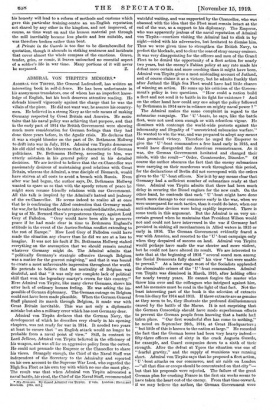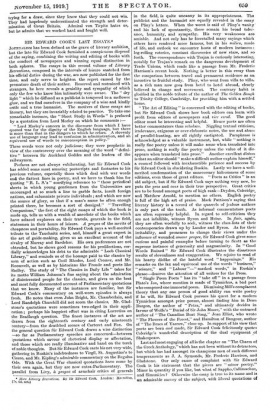ADMIRAL VON TIRPITZ'S MEMOIRS.*
ADMIRAL vox Tmarrz, like General Ludendorff, has written an interesting book in self-defence. He has been unfortunate in his anonymous translators, one of whom has an imperfect know- ledge of English, but his book deserves attentive reading. He defends himself vigorously against the charge that he was the villain of the piece. He did not want war, he assures his country- men. He believed in a strong Navy as the sole means of making Germany respected by Great Britain and America. He main- tains that his naval policy was achieving that purpose, and that in the early part of 1914 the British Government were showing much more consideration for German feelings than they had done three years before, in the Agadir crisis. He declares that it was a stupid blunder on the part of Dr. Bethmann Hollweg to drift into war in July, 1914. Admiral von Tirpitz denounces his old chief with the bitterness that is characteristic of German politicians. Dr. Bethmann Hollweg, according to him, was utterly mistaken in his general policy and in his detailed decisions. We are invited to believe that the ex-Chancellor was passionately desirous of maintaining good relations with Great Britain, whereas the Admiral, a true disciple of Bismarck, would have striven at all costs to avoid a breach with Russia. Even after war had begun, the author says, Dr. Bethmann Hollweg wanted to spare us so that with the speedy return of peace he might soon resume friendly relations with our Government. All this talk is inspired by the Admiral's hatred and jealousy of the ex-Chancellor. He seems indeed to realize all at once that he is confirming the Allied contention that Germany made the war, for he breaks off to enter into a confused diatribe, remind- 'Mg us of Mr. Bernard Shaw's preposterous theory, against Lord Grey of Fallodon. "Grey would have been able to preserve peace if he had made clear in time to Bethmann England's attitude in the event of the Austro-Serbian conflict extending to the rest of Europe." How Lord Grey of Fallodon could have made the situation any clearer than he did we are at a loss to imagine. It was not his fault if Dr. Bethmann Hollweg staked everything on the assumption that we should remain neutral whatever Germany might do. The Admiral admits that "politically Germany's strategic offensive through Belgium was a matter for the gravest misgiving," and that it was bound to create a most unfavourable impression throughout the world. He pretends to believe that the neutrality of Belgium was doubtful, and that "it was only our complete lack of political skill that won the legendary martyr's crown for this country." Here Admiral von Tirpitz, like many clever Germans, shows his utter lack of ordinary human feeling. He was asking the im- possible of German diplomacy. The German outrage on Belgium could not have been made plausible. When the German General Staff planned its march through Belgium, it made war with Great Britain inevitable. This was not only a diplomatic mistake but also a military error which has cost Germany dear.
Admiral von Tirpitz declares that the German Navy, the development of which he describes very clearly in his opening chapters, was not ready for war in 1914. It needed two years at least to ensure that "an English attack would no longer be probable from a naval point of view." Still, in contrast to Lord Jellicoe, Admiral von Tirpitz believed in the efficiency of his weapon, and was all for an aggressive policy from the outset. He could not persuade the Emperor or the Chancellor to share his views. Strangely enough, the Chief of the Naval Staff was independent of the Secretary to the Admiralty and reported on his own account to the Supreme War Lord, who regarded the High Sea Fleet as his own toy with which no one else must play. The result was that when Admiral von Tirpitz advocated a naval battle, his rival, the Chief of the Naval Staff, recommended
• My Menmire. By Grand Admiral von l'iroitz. 2 vols. London Hurst and Blackett. [28s. nct.j
watchful waiting, and was supported by the Chancellor, who was obsessed with the idea that the Fleet must remain intact at the end of the war, as a support to his diplomacy. The Emperor, who was apparently jealous of the naval reputation of Admiral von Tirpitz--courtiers visiting the Admiral had to slink in by night—sided with his adversaries, but hesitated to dismiss him. Thus we were given time to strengthen the British Navy, to perfect the blockade, and to clear the seas of stray enemy cruisers. It was very disappointing for the officers and men of the Grand Fleet to be denied the opportunity of a fleet action for nearly two years, but the enemy's Fabian policy at any rate made his defeat more certain and more crushing than it might have been. Admiral von Tirpitz gives a most misleading account of Jutland, and of course claims it as a victory, but he admits frankly that after Jutland the High Sea Fleet would have had little chance of winning an action. He sums up his criticism of the Govern- ment's policy in two questions. "How could a nation build a fleet and not send it to battle in its fight for existence ? And on the other hand how could any one adopt the policy followed by Bethmann in 1914 save in reliance on mighty naval power?"
The Admiral makes the same complaint in regard to the submarine campaign. The 'U '-boats, he says, like the battle fleet, were not used soon enough or with relentless vigour. He dismisses with contempt the world-wide protests against the inhumanity and illegality of "unrestricted submarine warfare." He wanted to win the war, and was prepared to adopt any means that promised victory. Therefore he urged the Emperor to give the 'U '-boat commanders a free hand early in 1915, and would have disregarded the American remonstrances. As it was, the German Government hesitated and changed their minds, with the result—" Order, Counterorder, Disorder." Of course the author obscures the fact that the enemy submarines were carrying on their murderous work throughout this period, for the declarations of Berlin did not correspond with the orders given to the 'U'-boat officers. Nor is it by any means clear that Germany had a sufficient number of submarines ready at that time. Admiral von Tirpitz admits that there had been much delay in securing the Diesel engines for the new craft. On the other. hand, he contends that each ' '-boat might have done much more damage to our commerce early in the war, when we were unprepared for such tactics, than it could do later, when our anti-submarine devices were being rapidly improved. There is some truth in this argument. But the Admiral is on very un- certain ground when he maintains that President Wilson would not and could not have intervened in the war if Germany had persisted in sinking all merchantmen in Allied waters in 1915 or early in 1916. The German Government evidently feared a war with America, and resorted to the 'U '-boat campaign only when they despaired of success on land. Admiral von Tirpitz would perhaps have made the war shorter and more violent, but he could not have altered its result. We are interested to note that at the beginning of 1916 "several sound men among the Social Democrats fully shared" his view "but were unable to prevail." At a later stage most of the Socialists applauded the abominable crimes of the 'U '-boat commanders. Admiral von Tirpitz was dismissed in March, 1916, after holding office - for nearly twenty years. He cannot forgive the master who threw him over and the colleagues who intrigued against him, and his memoirs must be read in the light of that fact. Not the least interesting part of the book is the selection of extracts from his diary for 1914 and 1915. If these extracts are as genuine as they seem to be, they illustrate the profound disillusionment caused by the battle of the Marne. It is not surprising that the German Censorship should have made superhuman efforts to prevent the German people from knowing that a battle had taken place. "Our first wonderful élan has come to nothing," he noted on September 26th, 1914, at Great Headquarters ; "but little of this is known to the nation at large." He recorded the fact that the German losses had been very heavy indeed— fifty-three officers out of sixty in the crack Augusta Guards, for example, and Guard companies down to a sixth of their strength. After the defeat at Ypres the situation was one of "fearful gravity," and the supply of munitions was running short. Admiral von Tirpitz says that he proposed a fleet action, U '-boat attacks on our commerce, and air raids on London —"all that flies or creeps should be concentrated on that city "— but that his proposals were rejected. The failure of the great German plan for crushing France in the first six weeks seems to have taken the heart out of the enemy. From that time onward, if we may believe the author, the German Government were
trying for a draw, since they knew that they could not win. They had hopelessly underestimated the strength and deter- mination of Great Britain. Admiral von Tirpitz hates us, but he admits that we worked hard and fought well.







































 Previous page
Previous page